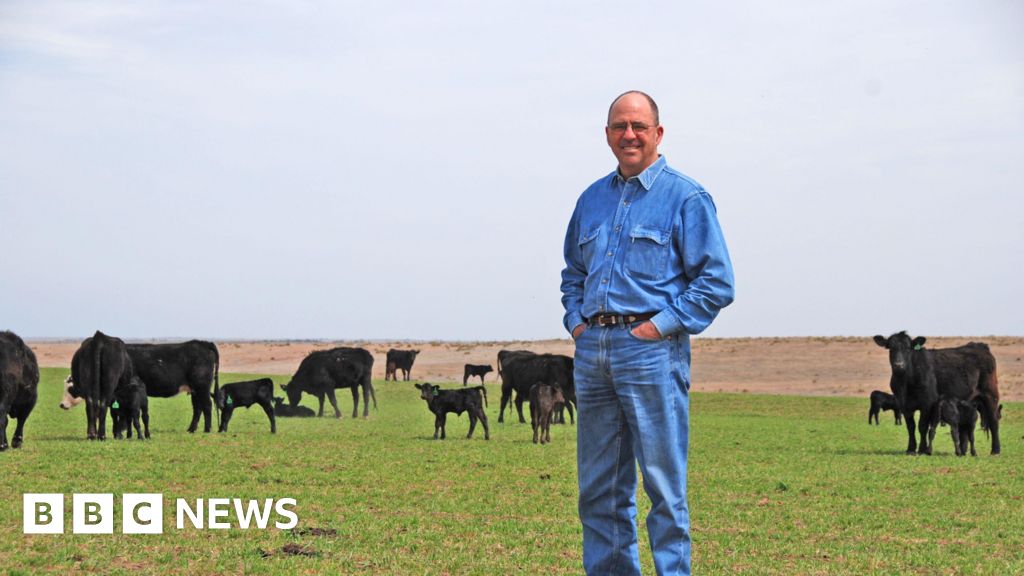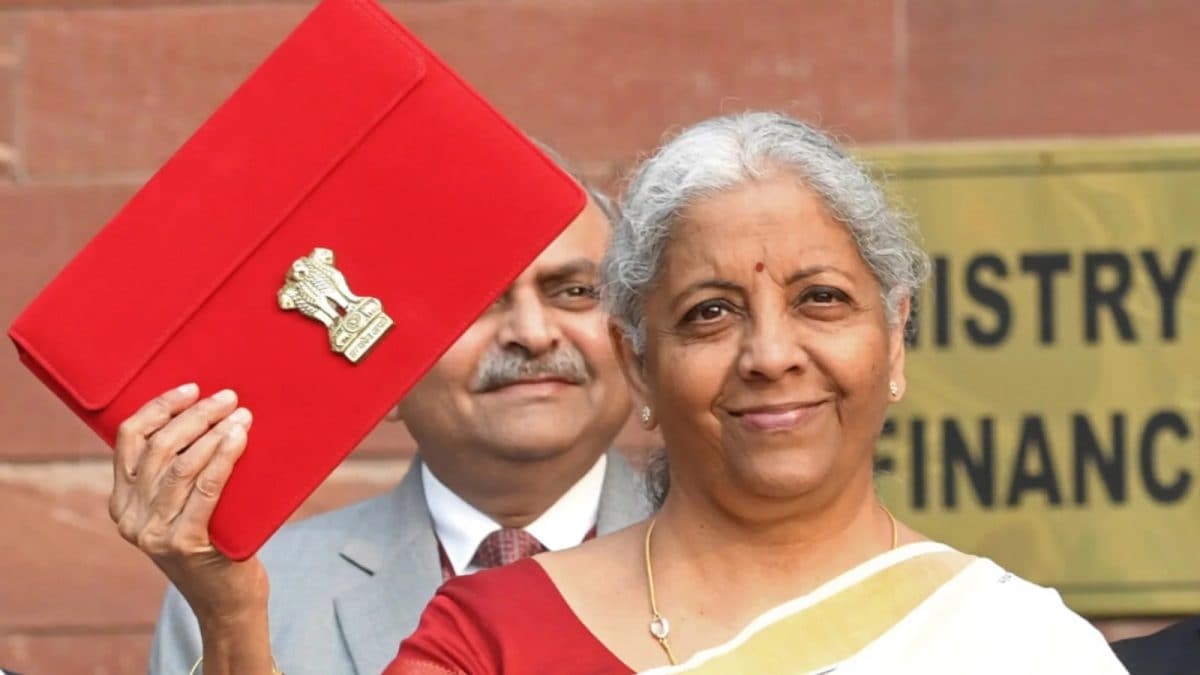Business
US beef prices are soaring. Will Trump’s plans lower them?

Danielle KayeBusiness reporter
 Mike Callicrate
Mike CallicrateBeef prices have gotten so high in the US that it has become a political problem.
Even US President Donald Trump, who long ago declared inflation “dead”, is talking about it, as the issue threatens to undercut his promises to bring down grocery prices for Americans.
This week, he took to social media, urging ranchers to lower prices for their cattle.
But his demand – and other proposals his administration has floated to address the issue – has sparked a backlash among ranchers, who worry some of his solutions will make it harder for them to make a living, while making little dent at the grocery store.
The number of beef cattle farmers and ranchers in the US has dwindled steadily since 1980, reducing domestic supplies and driving up prices, as demand remains high.
The country’s cattle inventory has fallen to its lowest level in nearly 75 years, while the US has lost more than 150,000 cattle ranches since 2017 – a 17% drop, according to the Agriculture Department.
Ranchers say they are under pressure from four decades of consolidation among the meat processors that buy their livestock, while high costs for key inputs like fertiliser and equipment have intensified the strain.
The contraction in the industry has worsened as several years of drought have forced ranchers to slash their herd sizes.
Christian Lovell, a cattle rancher in Illinois, says parts of his farm that were lush and grassy when he was a child have now dried up, limiting where his cows can graze.
“You put all these together and you have a recipe for a really broken market,” says Mr Lovell, who works with advocacy group Farm Action.
Beef inflation
Retail prices for beef mince rose 12.9% in the 12 months to September, and beef steaks were up 16.6%, according to US inflation data published on Friday by the Bureau of Labor Statistics.
A pound of ground chuck – richer mince from the neck and shoulder of cows – now costs an average of $6.33 (£4.75), compared to $5.58 a year ago.
The increases have significantly outpaced general food inflation, which stood at 3.1%.
“The cattle herd has been getting smaller for the last several years, yet people are still wanting that American beef – hence the high prices,” says Brenda Boetel, a professor of agricultural economics at the University of Wisconsin, River Falls.
Derrell Peel, a professor of agricultural economics at Oklahoma State University, says he expected prices to remain elevated until at least the end of the decade, noting that it takes years to replenish herds.
The Trump administration’s “hands are tied” when it comes to interventions that will help lower prices, he adds.
 Reuters
Reuters‘Chaos’ for US producers
The Agriculture Department unveiled what it called a “big package” this week aimed at ramping up domestic beef production by opening more land for cattle grazing and supporting small meat processors.
That proposal came after Trump drew the ire of ranchers when he proposed importing more beef from Argentina, potentially quadrupling US purchases.
Eight House Republicans responded with a letter expressing concerns about the plans.
Even the National Cattlemen’s Beef Association, which has voiced support for Trump’s policies in the past, said the import plan “only creates chaos at a critical time of the year for American cattle producers, while doing nothing to lower grocery store prices”.
Trump responded by assuring farmers that he was helping them in other ways, noting that tariffs that were limiting imports from Brazil.
“It would be nice if they would understand that, but they also have to get their prices down, because the consumer is a very big factor in my thinking, also,” Trump wrote.
But that has failed to quell the furore.
Justin Tupper, president of the US Cattlemen’s Association, says only the big four meat packers would benefit from Trump’s import plan in his view.
“I don’t see that lowering prices here at all,” he says.
‘These are consolidated markets’
Some say the US government could make an impact if it focused on the way a handful of companies dominate the market for meat processing.
Today, just four firms control more than 80% of the beef slaughtering and packing market.
“These are consolidated markets gouging ranchers and gouging consumers at the store,” said Austin Frerick, an agricultural and antitrust policy expert and a fellow at Yale University.
The meat processing firms – Tyson, JBS, Cargill and National Beef – have faced several lawsuits, including one filed by McDonald’s alleging that they colluded to inflate the price of beef.
Though Trump revoked a Biden-era order earlier this year directing agencies to tackle corporate consolidation across the food supply chain, his administration has taken other steps to investigate competition issues in the agricultural industry.
‘We’re not going to rebuild this cow herd’
Mike Callicrate runs a cattle ranch in St Francis, Kansas. He says the only way he has managed to stay in the industry was by cutting out the middleman and setting up his own stores to reach consumers directly.
But he acknowledged that most ranchers do not have the money to make that shift. Many have left the industry – and see no incentive to jump back in.
“We’re not going to rebuild this cow herd – not until we address market concentration,” Mr Callicrate says.
He adds that he supported the Agriculture Department’s plans to open up more cattle grazing land.
“But unless we have a market”, anyone would be a “fool to get into the cattle business”, he says.
 Bill Bullard
Bill BullardBill Bullard found himself in the first wave of ranchers pushed out as the meat processing industry started to consolidate in the early 1980s.
He closed down his 300-cow operation in South Dakota in 1985.
Now the chief executive of R-CALF USA, a cattle producer trade association, he says it was only in the last year or so that ranchers had received good prices for their livestock, as supply dropped to such a low level that the prices paid by meat processors “simply had to increase”.
Still, reliance on imports and meat packers’ buying power persists, Mr Bullard says, meaning ranchers “lack confidence in the integrity of the marketplace” and remain reluctant to grow their herds.
He says he does not have confidence that the president’s ideas would fix the issues.
“He’s focused on the symptoms and not the problems.”
Business
Harry Styles and Anthony Joshua among UK’s top tax payers

The former One Direction member-turned-solo artist appears on the Sunday Times list for the first time.
Source link
Business
From Manufacturing To Infra And AI: Capex Boost Flags Off Budget 2026 ‘Reforms Express’

Last Updated:
Budget 2026: FM Nirmala Sitharaman gives a strong push to manufacturing, infrastructure and job creation, while proposing a simpler tax and customs system.

Finance Minister Nirmala Sitharaman presents the Union Budget 2026-27.
Budget 2026 Takeaways: Finance Minister Nirmala Sitharaman on Sunday presented the Union Budget 2026-27, giving a strong push to manufacturing, infrastructure and job creation, proposing a simpler tax and customs regime, and hailing the government’s modernisation drive as a “reforms express”.
The Budget 2026 is anchored around three ‘kartavyas’ — driving growth by enhancing productivity and competitiveness, building people’s capacity, and ensuring inclusive development under the vision of Sabka Saath, Sabka Vikaas.
In her ninth consecutive Budget in Parliament, Sitharaman laid out a multi-pronged strategy to sustain growth amid global uncertainty, including expanding domestic electronics and semiconductor capabilities, de-risking infrastructure projects, skilling India’s youth for emerging technologies, and easing compliance for taxpayers and importers.
Here are the key takeaways from Budget 2026 across manufacturing, infrastructure, skills, AI, taxation and customs duty.
Manufacturing Gets A Boost
Budget 2026 put a special emphasis on the manufacturing landscape in India. The outlay for electronics components manufacturing was raised sharply to Rs 40,000 crore, while new schemes for rare earth magnets, chemical parks, container manufacturing and capital goods seek to reduce import dependency, and strengthen domestic supply chains. Textiles got an integrated, employment-oriented package covering fibres, clusters, skilling and sustainability.
Infrastructure-Led Growth
Infrastructure got a boost with a higher capex allocation and initiatives like a risk guarantee fund to de-risk projects for private developers, new dedicated freight corridors and national waterways, dedicated REITs (real estate investment trusts) for recycling of significant real estate assets of central public sector enterprises (CPSEs), and a seaplane VGF (viability gap funding) scheme.
The Centre’s capital expenditure (capex) target has been increased to Rs 12.2 lakh crore for FY27, up from Rs 11.2 lakh crore earmarked for the current financial year. Moreover, maintaining the fiscal discipline, Sitharaman said the government expects the fiscal deficit to be at 4.3 per cent of the GDP in 2026-27, lower than 4.4 per cent projected for the current financial year.
Tier-II and Tier-III cities were placed at the centre of urban growth via City Economic Regions, backed by reform-linked funding.
“We shall continue to focus on developing infrastructure in cities with over 5 lakh population (Tier II and Tier III), which have expanded to become growth centres,” Sitharaman said in her Budget Speech.
Greater Emphasis On Skilling
The Budget placed renewed emphasis on the services economy as a jobs engine. A high-powered Education-to-Employment and Enterprise Committee will realign skilling with market needs, including the impact of emerging technologies.
Content creation and creative industries get a boost through AVGC labs in schools and colleges, support for animation, gaming and comics, and new institutional capacity for design and hospitality. Tourism-linked skilling, from guides to digital heritage documentation, signals a clear intent to convert culture and content into employment and exports.
“I propose to support the Indian Institute of Creative Technologies, Mumbai in setting up AVGC Content Creator Labs in 15,000 secondary schools and 500 colleges,” FM Sitharaman said. AVGC stands for animation, visual effects, gaming and comics.
AI & Semiconductors Push
Artificial intelligence (AI) was positioned as a cross-sector force multiplier rather than a standalone theme. The Budget provided a push to artificial intelligence (AI) by promoting adoption with governance, agriculture, education and skilling, including proposals for AI-enabled advisory tools for farmers and AI integration in education curricula.
On hardware, the semiconductor strategy expanded decisively under ISM 2.0 (India Semiconductor Mission 2.0), with focus on domestic equipment manufacturing, materials, research centres and workforce development, signalling a long-term commitment to building a resilient chip ecosystem in India.
Taxation, ITR, TDS, TCS
A major structural reform comes with the Income Tax Act, 2025, effective April 1, 2026, containing simpler rules and redesigned forms.
Budget 2026 provided compliance relief for individuals, including extended timelines for revising returns to March 31 from December 31 earlier, staggered ITR due dates, and easier filing of Form 15G/15H through depositories.
Individuals with ITR-1 and ITR-2 returns will continue to file till July 31, and non-audit business cases or trusts are proposed to be allowed time till August 31, according to the Budget Speech 2026-27.
“I propose to extend time available for revising returns from 31st December to up to 31st March with the payment of a nominal fee. I also propose to stagger the timeline for filing of tax returns. Individuals with ITR 1 and ITR 2 returns will continue to file till 31st July and non-audit business cases or trusts are proposed to be allowed time till 31st August,” Sitharaman said.
TDS (Tax deducted at source) rules were clarified for manpower services, while a rule-based system for lower or nil TDS certificates is proposed. TCS rates were cut to 2% for overseas tour packages, education and medical expenses under liberalised remittance scheme (LRS). Litigation is targeted through integrated assessment and penalty orders, lower pre-deposit requirements, and wider immunity provisions.
TDS on the sale of immovable property by a non-resident will be deducted and deposited through resident buyer’s PAN (Permanent Account Number)-based challan instead of requiring TAN (Tax Deduction and Collection Account Number), Sitharaman said.
Customs Duty Tweaks
Customs duty rationalisation continued with a clear focus on domestic manufacturing, energy transition and ease of living. Exemptions have been extended or introduced for capital goods used in lithium-ion batteries, critical minerals processing, nuclear power projects and aircraft manufacturing.
Personal imports will become cheaper with a reduction in duty on goods for personal use from 20% to 10%. Seventeen cancer drugs and additional rare-disease treatments were exempted from customs duty. Process reforms aimed at trust-based, tech-driven clearances, faster cargo movement and lower compliance costs, especially for exporters and MSMEs (micro, small, medium and enterprises).
STT On F&O Hiked
The Budget increased securities transaction tax (STT) on futures trading from 0.02% to 0.05% and on options trading from 0.10% to 0.15%, a move that upset the capital markets with the BSE Sensex crashing more than 2,300 points from the day’s high and the NSE Nifty dropping to 24,571.75.
Securities Transaction Tax (STT) is a direct tax imposed on the buying and selling of securities in India.
Commenting on the Budget, Prime Minister Narendra Modi said, “The Union Budget reflects the aspirations of 140 crore Indians. It strengthens the reform journey and charts a clear roadmap for Viksit Bharat.”
February 01, 2026, 14:43 IST
Read More
Business
Air India resumes direct Shanghai-New Delhi flights after nearly six years

Shanghai (China): The Consulate General of India in Shanghai welcomed the resumption of Air India’s direct flight services between Shanghai and New Delhi, marking a major step forward in restoring people-to-people, business and institutional connectivity between India and China.
According to an official release, the inaugural Shanghai-New Delhi flight departed today from Shanghai Pudong International Airport, carrying over 230 passengers on board the Boeing 787 aircraft. The relaunch comes after a gap of nearly six years and represents a significant milestone in normalising bilateral air connectivity following the suspension of services in early 2020.
Speaking on the occasion, Consul General Pratik Mathur said, “The resumption of direct flights between Shanghai and New Delhi is a tangible expression of the renewed momentum in India-China engagement. Enhanced air connectivity is essential for facilitating trade, tourism, academic exchanges and people-to-people contacts, particularly between India and East China. We are pleased to see Air India restoring this important link.”
As per a release, Air India will operate the route four times a week using its Boeing 787-8 Dreamliner aircraft, featuring modernised cabins and enhanced onboard services. The restored service reflects the growing demand for travel between the two countries and the steady recovery of cross-border mobility. It will also support commercial, educational and cultural exchanges between India and the Yangtze River Delta region, one of China’s most economically dynamic clusters.
The Consulate General of India in Shanghai remains committed to supporting initiatives that strengthen connectivity and deepen cooperation across trade, investment, tourism, education and cultural exchange, the release stated.
-

 Sports5 days ago
Sports5 days agoPSL 11: Local players’ category renewals unveiled ahead of auction
-

 Tech1 week ago
Tech1 week agoThis Mega Snowstorm Will Be a Test for the US Supply Chain
-

 Entertainment5 days ago
Entertainment5 days agoClaire Danes reveals how she reacted to pregnancy at 44
-

 Tech1 week ago
Tech1 week ago‘Uncanny Valley’: Donald Trump’s Davos Drama, AI Midterms, and ChatGPT’s Last Resort
-

 Fashion1 week ago
Fashion1 week agoSpain’s apparel imports up 7.10% in Jan-Oct as sourcing realigns
-

 Tech1 week ago
Tech1 week agoICE Asks Companies About ‘Ad Tech and Big Data’ Tools It Could Use in Investigations
-

 Sports5 days ago
Sports5 days agoCollege football’s top 100 games of the 2025 season
-

 Fashion1 week ago
Fashion1 week agoTurkiye cuts benchmark rate to 37%, flags confidence on inflation







